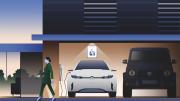Is a gas guzzler actually better for the environment than an electric vehicle? Sometimes.
Ashley Nunes, Harvard Law School’s Labor and Worklife Program fellow, and undergraduate economics concentrator Lucas Woodley ’23 found that many electric vehicle (EV) owners—usually wealthy individuals incentivized by federal tax credits to purchase an electric vehicle as a second car—are doing more environmental harm than good. Why? They’re not driving enough.
To build an electric-car battery, manufacturers need lithium, and to find lithium, they need the high-altitude salt flats of Bolivia, Chile, and Argentina. There, beneath turquoise brine lakes, is mud rich in manganese, potassium, borax, and lithium salts. It’s chemical- and water-intensive to isolate lithium from all that mud, and it takes even more energy to make a functional car battery from it. As a result, building a clean-burning EV battery is twice as greenhouse-gas-intensive as making a conventional internal combustion engine.
The high emissions buy-in of an EV “isn’t a dealbreaker,” Nunes says, because “an electric car is almost always cleaner to drive per mile, compared to a gasoline-powered one. However, to get that advantage, you need to ‘burn off’ the emissions associated with manufacturing the car.” A gas-powered car has an emissions head start, but once the EV is driven enough, it gains a “green lead” with its low per-mile emissions, Nunes says. “It’s this very odd situation where, paradoxically, you need to get people to drive more in order to get an emissions advantage”—the underpinning of his research with Woodley, published recently in Nature Sustainability.
If a household purchases a new EV and drives it as the primary car, it will take 28,069 miles of driving, or about 2.73 years, to gain a green lead. But most EV purchasers right now are wealthier people who use it as a secondary vehicle. Since those cars are driven less frequently, these households need to hang onto the car for about a decade to produce any emissions benefit.
But consumers aren’t doing that. According to Nunes, government data from Norway indicates that people who own both a gas- and an electric-powered vehicle choose to drive the former most of the time. And in general, EV owners sell the vehicle before it’s reached the green break-even point in miles. People who drive infrequently or don’t plan to own their EV for very long “are actually better off driving a gasoline-powered car if they care about the environment,” Nunes says. “This of course sounds very wrong, but it’s a matter of whether the numbers add up, and they don’t.”
Woodley says people who buy those EVs secondhand—generally poorer households who drive them for many miles and years as their primary vehicle—are the ones “actually responsible for the emissions reductions we hope to get from electric vehicles.”
Government subsidies miss this group entirely, though. The federal government provides a tax credit of up to $7,500 to those who purchase new electric vehicles, and some states like California offer additional rebates on top of that, sometimes totaling $19,000. It’s a generous rebate, but many electric vehicles cost more than the average American earns in a year.
“Even with a $10,000 subsidy, a $40,000 car is still $30,000,” Nunes says. “If you’re a poor American and all you can afford is a $10,000 car, this rebate isn’t going to matter to you.”
Policymakers need to ask, “What would these people buying electric cars have done if they did not have the subsidy?” Nunes says. “Would they still have gone out and bought the car? And by and large, we find that, guess what, the person buying a $120,000 [electric vehicle] would have still gone out and bought the car without a $7,500 subsidy.” Second-hand buyers, however, are more likely to benefit from a subsidy and benefit the planet—if policymakers find a way to reach them. Woodley says this might involve restructuring incentives around secondhand sales or subsidizing based on vehicle usage. (A bill being considered in the Senate as this magazine went to press aimed to do just that.)
“Electric vehicles offer the opportunity to reduce greenhouse gases, but that’s not necessarily a foregone conclusion,” Woodley says. People who drive frequently or keep their car for many years? “They’re perfect candidates,” he says. But infrequent drivers or those who want an EV as their secondary vehicle? They may want to “think long and hard” before heading to the Tesla dealership.









